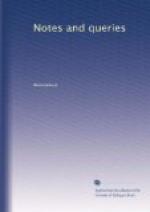S.A.Y.
Judge Cradock, afterwards Newton.—MR ELLACOMBE (Vol. ii., p. 249.), in his notice of a monument in Yatton Church to “Judge Newton, alias Cradock,” says, “the arms of Cradock are Arg. on chevron az. three garbs or.” Richard Cradock, he adds, “was the first of his family who took the name of Newton.” Does MR. ELLACOMBE mean that the above arms were those of the Cradock family, or that this Richard Cradock assumed the coat as well as the name of Newton? The above was the bearing of the family of Newton, of East Newton, in the North Riding of York. The eldest daughter and coheir of John Newton of East Newton was married to William Thornton, which family thus became possessed of the estate of East Newton, and quartered the coat assigned by MR. ELLACOMBE to Cradock. I should be glad to know the occasion on which Richard Cradock assumed the name and arms of Newton, as well as the connexion between these Newtons and those settled at East Newton.
S.A.Y.
Totness Church.—In Totness Church, the N. angle of the chancel is cut off in the lower part of the building, in order to allow an arched passage from one side of the church to the other outside.
The upper part of the building is supported by a very strong buttress or pier, leaving the diagonal passage between it and the internal wall. Can any one tell whether this was done merely to afford a gangway for want of room outside?
The graveyard has been recently enlarged in that direction, for all the tombstones beyond the line of the chancel appear to be of late date. An old woman informed me, with an air of solemn authenticity, that this arched passage was reserved as a place of deposit for the bodies of persons seized for debt, which lay there till they were redeemed.
H.G.T.
Meaning of “Harissers.”—It is customary in the county of Dorset, after carrying a field of corn, to leave behind a sheaf, to intimate to the rest of the parish that the families of those who reaped the field are to have the first lease. After these gleaners have finished, the sheaf is removed, and other parties are admitted, called “barissers.” I have been told that the real title is “arishers,” from “arista.” I should feel obliged if any of your correspondents could inform me whether this name is known in any other county, and what is the derivation of the word.
CLERICUS RUSTICUS.
Ringelbergius—Drinking to Excess.—Ringelbergius, in the notes to his treatise De Ratione Studii, speaking of great drinkers, has this passage:
“Eos qui magnos crateras haustu uno siccare possunt, qui sic crassum illud et porosum corpus vino implent, ut per cutem humor erumpat (nam tum se satis inquiunt potasse, cum, positis quinque super mensam digitis, quod ipse aliquando vidi, totidem guttae excidunt) laudant; hos viros esse et homines dicunt.”
He says that he himself has seen this. Does any reader of the “NOTES AND QUERIES” know of any other author who says that he has seen such an exhibition? Or can Ringelbergius’s assertion be confirmed from any source?




